Related Research Articles
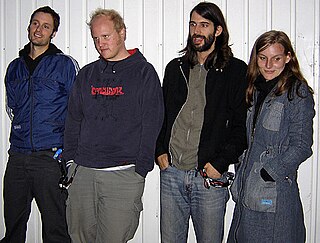
Wir sind Helden was a German pop rock band that was established in 2000 in Hamburg and based in Berlin. The band was composed of lead singer and guitarist Judith Holofernes, drummer Pola Roy, bassist Mark Tavassol and keyboardist/guitarist Jean-Michel Tourette.

"Die Gedanken sind frei" is a German song about freedom of thought. The original lyricist and the composer are unknown, though the most popular version was rendered by Hoffmann von Fallersleben in 1842.
"Jamaica Farewell" is a Jamaican-style folk song (mento). The lyrics for the song were written by Lord Burgess, an American-born, half-Barbadian songwriter. It is about the beauties of the West Indian Islands.

Min bäste vän is the seventh studio album by Swedish singer-songwriter Marie Fredriksson, released on 14 June 2006 by Capitol Records in conjunction with Fredriksson's own independent record label Mary Jane/Amelia Music. It is her sixth studio album of Swedish material, following her first and only English album The Change (2004).

Ann-Louise Hanson is a Swedish singer who has been involved in the music industry since 1956.
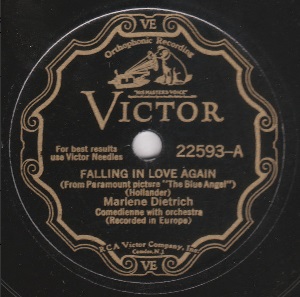
"Falling in Love Again " is the English language name for a 1930 German song composed by Friedrich Hollaender as "Ich bin von Kopf bis Fuß auf Liebe eingestellt". The song was originally performed, in the 1930 film Der Blaue Engel, by Marlene Dietrich, who also recorded the most famous English version, which became her anthem. Dietrich is backed by the Friedrich Hollaender Orchestra.
"100%" is a Swedish language song, written by Torgny Söderberg and Monica Forsberg. The song was sung by Lotta Engberg of the group Triple & Touch at the Swedish Melodifestivalen 1988, where it finished third with 47 points. The song text describes the days as a roller coaster, but it's also about love.

Der Graf von Luxemburg is an operetta in three acts by Franz Lehár to a German libretto by Alfred Willner, Robert Bodanzky, and Leo Stein. A Viennese take on bohemian life in Paris at the beginning of the 20th century, the story revolves around an impoverished aristocrat and a glamorous opera singer who have entered into a sham marriage without ever seeing each other and later fall in love at first sight, unaware that they are already husband and wife.
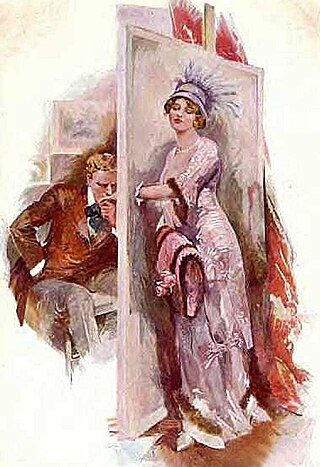
The Count of Luxembourg is an operetta in two acts with English lyrics and libretto by Basil Hood and Adrian Ross, music by Franz Lehár, based on Lehár's three-act German operetta Der Graf von Luxemburg which had premiered in Vienna in 1909. Lehár made amendments to his Viennese score to accommodate the two-act adaptation. He also interpolated into the score three new pieces: a waltz that he had written for a commemorative performance of Der Graf in Vienna; a song from his first operetta, Wiener Frauen; and a Russian dance from the opera Tatjana.

Birgit Rose-Marie Anlert, known professionally as Towa Carson, is a Swedish schlager singer.
"The Faithful Hussar" is a German song based on a folk song known in various versions since the 19th century. In its current standard form, it is a song from the Cologne Carnival since the 1920s.

"Colorado" was the Dutch entry in the Eurovision Song Contest 1979, performed in Dutch by the six-piece group Xandra, fronted by Sandra Reemer.
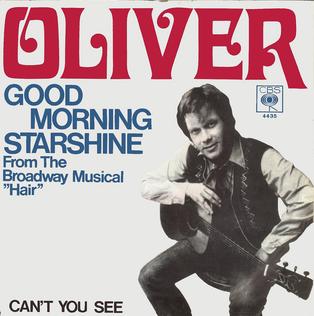
"Good Morning Starshine" is a pop song from the musical Hair (1967). It was a No. 3 hit in the United States in July 1969, and a No. 6 hit in the United Kingdom in October 1969, for the singer Oliver.
"Hem till Norden", also known as Julklockor över vår jord, is a song that has been a Svensktoppen hit in two different lyrics version.
"Dover–Calais" is a ballad song written by Tommy Ekman and Christer Sandelin, and originally performed by Style on 22 March 1986 at Melodifestivalen where the song ended up third.

"När vi två blir en", written by Per Gessle, also known by the refrain's opening line "Jag vill känna din kropp emot min", is a song with lyrics describing teenage love, released as a single on 29 October 1980 by pop group Gyllene Tider. Göran Fritzson wrote the Farfisa intro and the hook. Gyllene Tider also recorded the song with lyrics in English, as "Beating Heart", releasing it as a promotional single on 1 September 1981 using the group name Modern Times.
Ganz in Weiß is a song written by Rolf Arland (music) and Kurt Hertha (lyrics) and recorded by Roy Black in 1965. He also recorded an English version I need you and an Italian version Grazie mille, both released in 1966
Wärst du doch in Düsseldorf geblieben is a song written by Georg Buschor and Christian Bruhn and made famous by a 1968 recording by Dorthe Kollo.

"Delirium" is a song by Swedish singer Lena Philipsson from her ninth studio album Det gör ont en stund på natten men inget på dan (2004). It was released as the album's second single on 7 July 2004 through Columbia and Sony Music. Written by Thomas "Orup" Eriksson and produced by Anders Hansson, "Delirium" is a disco and power pop song with synthesizer and guitar instrumentation and schlager influences.
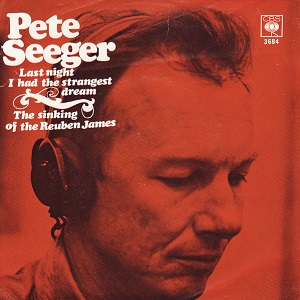
"Last Night I Had the Strangest Dream" is a song written by American folk singer-songwriter Ed McCurdy in 1950. Due to McCurdy's connection with fellow musicians, it was common in repertoires within the folk music community. The song had its first album release when Pete Seeger recorded it as "Strangest Dream" for his 1956 album Love Songs For Friends & Foes. Seeger would later re-visit the song for his 1967 album Waist Deep in the Big Muddy and other Love Songs. The strong anti-war theme of the song led it to be recorded by multiple other artists, including The Weavers (1960), Joan Baez (1962), The Kingston Trio (1963), Simon & Garfunkel (1964), and Johnny Cash who released two versions of the song during the 2000s.
References
- ↑ "Dorthe* – Sind Sie Der Graf Von Luxemburg? / Was ist bloß mit dem Torero los?". Discogs. 1968. Retrieved 19 June 2014.
- ↑ "Min greve av Luxemburg" (in Swedish). Svensk mediedatabas. 1968. Retrieved 19 June 2014.
- ↑ "Svensktoppen 1968" (in Swedish). Sveriges Radio. 1968. Retrieved 19 June 2014.